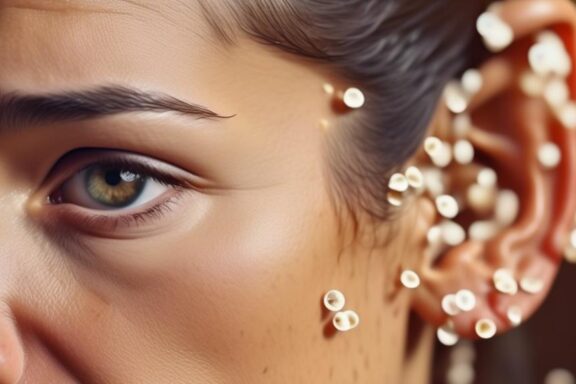We all know no magic diet works for everyone. This is where the Hormone Type 7 Diet comes in, offering a plan that gets our hormones to play nice.
If you’ve tried dieting before, you might agree that figuring out hormones like insulin, cortisol, and estrogen could be the key we’ve all been missing. This goes beyond just picking veggies over sweets; it’s about understanding how our bodies decide to hang onto fat or let it go.
Could it be that personalizing our diets to match our hormonal makeup is the game-changer we’ve been waiting for? Let’s walk through what the Hormone Type 7 Diet is all about. Who knows? It might be the answer to keeping the weight off for good.
Key Takeaways
- The Hormone Type 7 Diet is a weight loss program that focuses on balancing hormones to achieve sustainable weight loss goals.
- The main hormones addressed in this diet are insulin, cortisol, and estrogen, which play a role in regulating blood sugar levels, managing stress, and fat storage respectively.
- The diet emphasizes nutrient-dense foods such as vegetables, lean proteins, healthy fats, and complex carbohydrates while restricting processed foods, sugar, and refined grains.
- In addition to diet, the Hormone Type 7 Diet also emphasizes lifestyle factors such as managing stress levels, getting adequate sleep, and engaging in regular physical activity to support hormone balance and weight loss.
Overview of Hormone Type 7 Diet

The Hormone Type 7 Diet is all about getting those pesky hormones in check to help you lose weight in a healthy, steady way. You know how sometimes it feels like your body is working against you? Well, that might be because hormones like insulin, cortisol, and estrogen are out of whack. This diet is here to help fix that.
We’re all about eating foods that are packed with nutrients and cutting back on the processed stuff. After all, the kinds of food we munch on are super important for keeping our hormones happy. But hey, it’s not only about what’s on your plate; we’re also big on chilling out to tackle stress and getting our bodies moving the right way every day. It’s about the whole package – not just shedding pounds but also feeling great and balanced.
Hormonal Imbalance and Weight Loss
Understanding the relationship between hormonal imbalances and weight loss is pretty important. These imbalances can mess with our metabolism, causing us to constantly want to eat and store fat in places we don’t want it. It can be annoying when you’re trying to shed some pounds, but your body just isn’t on the same page.
It’s not all about having strong willpower; the hormones in our bodies have a big say in how we store and burn off fat. Getting our hormones in check can help us out in losing weight.
So, let’s break it down:
- If your hormones are out of whack, it can lead to putting on weight and make it tough to lose it.
- Changes in hormone levels can make you feel hungrier and crave certain foods more.
- When you get your hormones balanced, it can make your metabolism work better and increase how much fat you burn.
- Eating in a way that addresses hormonal imbalances is all about getting those hormone levels back to normal and helping you with your weight loss goals.
Role of Insulin in Metabolism
Let’s talk about insulin, the unsung hero of our metabolism and energy levels. Picture a hormone that’s like a VIP pass for sugar – that’s insulin for you. Every time we eat, especially carbs, our blood sugar goes up. Insulin jumps into action, helping our cells soak up that sugar and use it to keep us going or save it for later.
But here’s the deal: if we’re always munching on processed snacks, our body gets lazy at responding to insulin, and that often leads to packing on extra pounds. The trick is to play it smart with what we eat. A well-rounded diet keeps insulin doing its thing without a hitch, helping us dodge those nasty sugar highs and lows that make us want to raid the fridge.
Impact of Cortisol on Appetite
Cortisol, the hormone we often link to stress, directly impacts our desire to eat and can lead to us packing on extra pounds. When stress hits, we tend to produce more cortisol, and this messes with how we regulate our hormones. If you’re trying to watch what you eat, it’s worth paying attention to how cortisol comes into play.
So, let’s talk about the way cortisol can mess with our eating habits and why we might find more fat clinging to our waistlines:
- It makes us reach for the cookie jar or the ice cream tub more often than we should.
- It tricks us into thinking we’re hungry, even when our body isn’t asking for food.
- It’s pretty good at making sure fat sticks around, especially where we don’t want it – like our belly.
- It throws off the signals that usually tell us we’ve had enough to eat, which can lead to us overdoing it at the dinner table.
If you’re trying to control your appetite and drop some weight, it’s a smart move to get to know how cortisol plays its part.
Estrogen and Fat Storage
Cortisol isn’t the only hormone that messes with our hunger and where our bodies store fat. Estrogen is key for reproductive health, but when it gets out of whack, it can mess with our weight, too. You might notice more fat around your hips and thighs if your estrogen levels are off.
But hey, there’s good news! Eating the right stuff can help you shed pounds and get those hormones back on track. We’re talking foods packed with fiber, omega-3s, and those good-for-you antioxidants.
Importance of Stress Reduction
When you get a handle on stress, you’re directly influencing hormones that play a role in weight management. Take cortisol, for example; too much of it can lead to unwanted weight gain because it drives us to eat more and favors fat accumulation. So when we’re stressed out, even our most determined attempts to keep a healthy weight might fall flat.
Let’s break this down into simple actions everyone can relate to:
- Regular exercise is a real game-changer for beating back stress.
- Simple meditation or just taking deep breaths can bring back a sense of peace.
- Eating foods rich in nutrients can help keep your hormones in check.
- And don’t forget, getting enough sleep is the cornerstone of helping your body bounce back and keep those hormones in line.
Nutritional Guidelines for Hormone Balance
Managing stress is super important for keeping our hormones in check. But hey, don’t forget that what we munch on is just as key. So, with the Hormone Type 7 Diet, we’re all about loading up on foods that are jam-packed with nutrients and give our hormones the boost they need.
Picture your plate brimming with colorful veggies, lean meats, good fats, and whole grains. And let’s not get started on those processed foods – they’re no friends to our hormonal health, that’s for sure.
Every snack and meal is a chance to either keep things running smoothly or to stir up trouble hormone-wise. We’re making smart choices, picking foods that do right by our bodies. And it’s not just about shedding pounds – it’s about feeling great all around.
Lifestyle Choices in Hormone Type 7 Diet
In addition to changing what you eat, it’s just as vital to look at your whole lifestyle when you’re on the Hormone Type 7 Diet. It’s not only about the food – your daily habits matter when it comes to getting your hormones in check and hitting your health targets.
So, let’s break down the main habits that we’re zeroing in on:
- Getting active regularly: Making sure you move your body regularly is a big help in keeping your insulin and cortisol levels steady.
- Getting enough sleep: Aiming for 7-9 hours of solid sleep is a key part of keeping your hormones like cortisol and insulin balanced.
- Managing stress: Taking time to chill out with some meditation or yoga can help bring down those cortisol levels.
- Staying hydrated: Keeping up with your water intake is super important for your body’s metabolism and can even help you recognize when you’re truly hungry.
These are the core lifestyle tweaks that can make a real difference when you’re following the Hormone Type 7 Diet.
Personalizing the Hormone Type 7 Diet
We all know that what works for one person mightn’t work for another, especially with something as personal as dieting. By taking a good look at your hormonal imbalances, we can put together meal plans and lifestyle changes that are right up your alley.
We’re talking about choosing foods packed with nutrients, keeping stress in check, and getting your body moving in ways that feel good. And we won’t just set it and forget it – we’ll keep an eye on how you’re doing and make little changes as needed to keep you on track.
This isn’t just about shedding pounds; it’s about finding a way to live healthily that you can stick to and that makes your hormones happy. We’re here to help you find that sweet spot.
Achieving Sustainable Weight Loss
If we want to keep the weight off for good, we need to get to the root of the problem: hormone imbalances that mess with our dieting plans. The Hormone Type 7 Diet shows us the way, making sure we don’t just lose those extra pounds but also keep them off for the long haul.
Here’s our game plan for beating stubborn weight:
- We’re picking foods that are rich in nutrients and help our hormones stay in balance.
- We’re adding exercises to our routine that are good for our hormones but don’t push our bodies too hard.
- We’re making sure to get plenty of sleep, which is key for keeping our hormones in line.
- We’re picking up techniques to manage our stress better, which helps keep cortisol levels down and fight off weight gain.
what are the 7 metabolic renewal hormone types?
Talking about balancing hormones, it’s pretty key for keeping your weight in check. But let’s get into the nitty-gritty of what’s behind this – the specific hormone types that come into play during a woman’s life.
I’m talking about the ups and downs of hormones during times like your period, the lead-up to menopause, and the big M itself. It’s a mix of estrogen, progesterone, and a few others that can throw your metabolism for a loop. Knowing your hormone game plan can help tailor your diet and lifestyle to keep your metabolism humming.
Now, when it comes to Dr. Natasha Turner’s take on this, she doesn’t lay out ‘7 metabolic renewal hormone types’ the way you might think. She’s more about keeping an eye on the big players – insulin, cortisol, and estrogen – to help with weight loss and staying healthy overall.
Vegetarian and Vegan Adaptations
If you’re following a vegetarian or vegan lifestyle, you can tweak the Hormone Type 7 Diet to fit your needs. Let me break it down for you:
- Swap out meaty proteins for things like lentils, chickpeas, and tofu. That way, you’ll keep your protein levels up.
- Snack on a bunch of nuts and seeds. Flaxseeds and walnuts are great for adding those necessary healthy fats to your diet.
- Go for whole grains and root veggies instead of those processed carbs. They’ll give you a steady stream of energy and help keep your insulin levels nice and steady.
- Since you’re not getting certain nutrients from meat, think about taking supplements for B12, iron, and whatever else you might be missing to keep those hormones happy.
Frequently Asked Questions
How Does the Hormone Type 7 Diet Differ From Other Popular Diets That Focus on Hormone Health, Such as the Ketogenic or Paleo Diets?
Let’s talk about the Hormone Type 7 diet and how it’s different when it comes to targeting insulin, cortisol, and estrogen. Other diets don’t always focus on these hormones specifically for shedding pounds and maintaining hormonal equilibrium.
If I Have a Thyroid Condition, Such as Hypothyroidism or Hyperthyroidism, Will the Hormone Type 7 Diet Need to Be Adjusted to Accommodate My Condition?
Recently, we found out that those of us with thyroid problems, like hypothyroidism or hyperthyroidism, really need to tweak the Hormone Type 7 Diet to make sure it fits our specific needs.
Are There Any Cultural or Ethnic Considerations Taken Into Account With the Hormone Type 7 Diet, Given That Dietary Habits Can Vary Significantly Around the World?
We’ve taken into account the variety of cultural and ethnic eating patterns to make sure our hormone type 7 diet can be tailored to anyone, no matter where they live. This diet is designed to be flexible, accommodating different tastes and the kinds of foods that are locally available.
Can the Hormone Type 7 Diet Be Safely Implemented During Pregnancy or Breastfeeding, or Are There Modifications That Should Be Made?
We get that there might be some worries about following a special diet when you’re pregnant or nursing. If you’re considering the Hormone Type 7 Diet during these times, it’s best to talk it over with your doctor and tweak it as needed. That way, you can make sure you and your little one are getting all the nutrients you both need.
How Does the Hormone Type 7 Diet Approach Alcohol and Caffeine Consumption, Given Their Potential Effects on Hormone Levels and Balance?
We’re pretty careful with things like alcohol and caffeine because, honestly, they can mess with our hormone balance. When we’re talking about this diet, it generally advises that we cut back on both. That way, we keep our hormone levels where they should be and make our journey to losing weight a bit smoother.
Conclusion
In our shared experience, we’ve taken to the Hormone Type 7 Diet as our guide through the tricky landscape of losing weight. It’s designed to listen to what our hormones are trying to tell us and use that to drive our success as we figure out the complexities of metabolism.
We’re customizing our meals to work with our body’s natural rhythms, and it’s not just about shedding pounds; it’s about finding a healthy balance.








No Comments